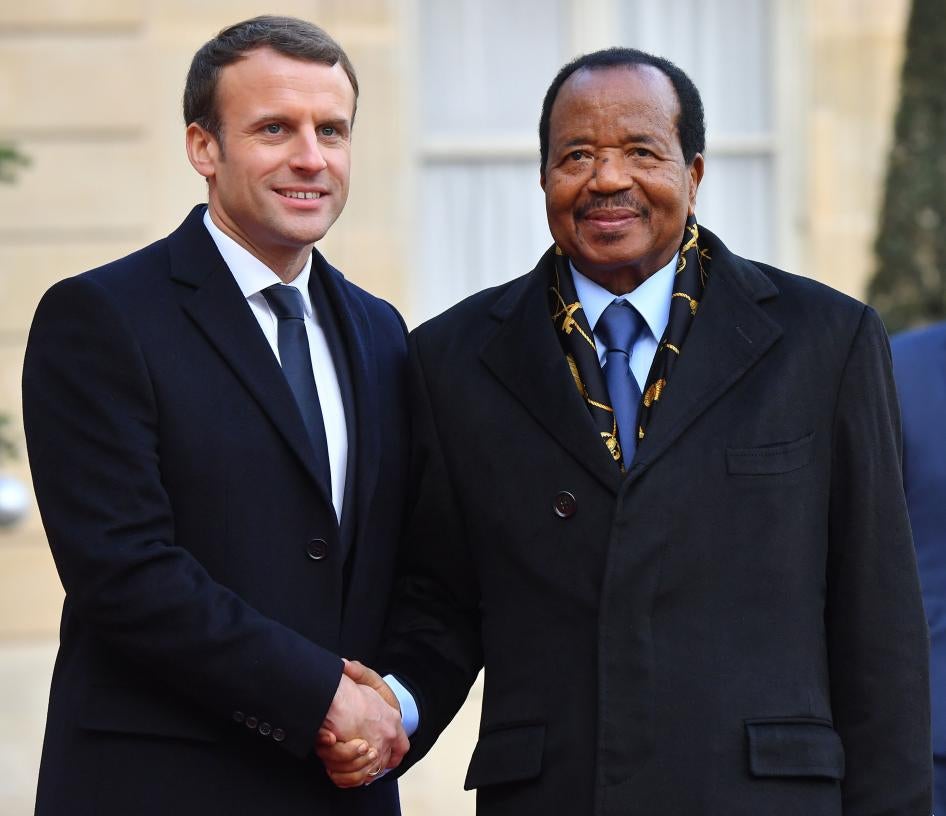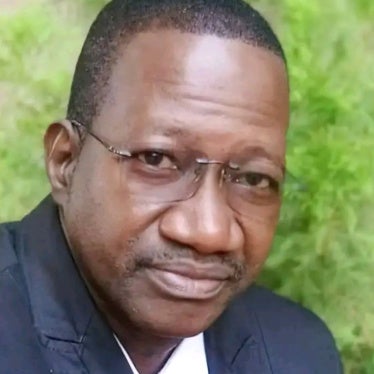President Emmanuel Macron of France is expected in Cameroon July 25 and 26 amid a climate of heightened repression. Two and a half years earlier, Macron promised a Cameroonian citizen, who confronted him in Paris about the human rights situation in Cameroon, that he would exert “maximum pressure [on Cameroon's President Paul Biya] to put an end to this situation.”
The situation has since deteriorated. For this reason, it is crucial that the French president go beyond strengthening economic, political, and cultural ties between the two countries by expressing France’s solidarity in the struggle against the Boko Haram insurgency in the Far North region since 2013.
When he meets President Paul Biya, who has been in power since 1982, the French president should clearly express his concerns over the human rights violations committed by security forces in the two Anglophone regions of the North-West and South-West since 2016, as well as the crackdowns against people critical of the authorities. Torture and arbitrary detention and arrest are rife in Cameroon today.
Since the brutal repression of protests in 2016 and 2017 against the professed marginalization of the Anglophone minority as it relates to their education and justice systems, the daily lives of residents of the North-West and South-West have been punctuated by clashes between the army and increasingly well-equipped armed separatist groups. These groups circulate images of their crimes on social media, including attacks on pupils, teachers, and schools. In response, the army is killing civilians and burning down entire villages accused of supporting the separatists. Human rights defenders who criticize these atrocities are threatened with death.
The humanitarian consequences of this violence are disastrous. Almost 600,000 people are displaced in the two Anglophone regions, and more than 75,000 have fled to neighboring Nigeria.
Impunity continues to be one of the main drivers of violence and is fueling further abuses. The army's admission that it was responsible for the death of nine people in the village of Missong on June 1, 2022, is an important step in the fight against impunity. However, authorities have yet to demonstrate their willingness to sanction abuses, with the government repeatedly failing to keep to its commitments in this regard. Indeed, more than two years after the Ngarbuh massacre on February 14, 2020—in which the government acknowledged the army's involvement—the trial of 21 individuals accused of being implicated in the murder of 21 civilians has been dragging on for 19 months.
The Cameroonian authorities are also committing abuses against people exercising their right to peaceful assembly. Military courts—sometimes pursuant to an anti-terrorism law originally adopted in 2014 in connection with the fight against Boko Haram—convicted tens of residents of the Anglophone regions and supporters or sympathizers of the opposition party Cameroon Renaissance Movement (MRC) in recent years for protesting. Many are still in prison today.
Those in prison include the journalist Tsi Conrad, who was sentenced on May 25, 2018, to 15 years of imprisonment for taking part in a protest in the town of Bamenda, North-West region, in 2016. In May 2021, the United Nations Working Group on Arbitrary Detention classified his detention as arbitrary and called for his release.
As of April 8, 2022, 105 MRC supporters and sympathizers have been sentenced by military courts to prison terms ranging from two to five years for defying a ban on protests in September 2020.
Many of these detainees have suffered torture and other forms of mistreatment in various detention facilities. Some Anglophone detainees who fell ill died chained to their hospital beds. Others died because of the appalling detention conditions in the country's prisons, including Rodrigue Ndagueho Koufet, one of the six detainees in Douala prison who died of cholera between February and April 2021. He had been held arbitrarily since September 2020 for taking part in peaceful assemblies.
Cameroonian authorities are committing these violations in defiance of international law. The African Commission on Human and Peoples’ Rights (ACHPR) has been waiting since 2018 for a response to its request to carry out a fact-finding mission to investigate the alleged violations.
The people of Cameroon and the families of the victims of abuse in the Anglophone regions deserve answers. Emmanuel Macron should use the opportunity to meet with his Cameroonian counterpart to support a call for truth and justice and to put an end to impunity for crimes committed by the security forces, as well as protecting civilians from abuses by armed groups. The French president should also put pressure on President Biya to act on respect for freedom of expression and protest with a view to securing the release of the activists and opponents unjustly detained. Finally, Emmanuel Macron should point out that the fight against terrorism does not excuse how fundamental rights are suppressed, and critical voices are crushed.








